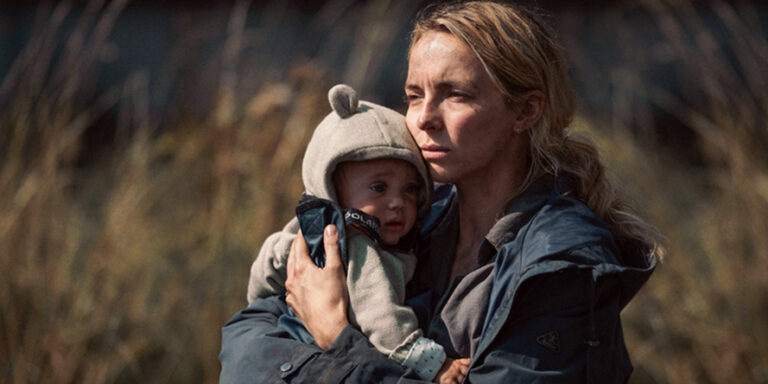
Dystopias don’t emerge purely from science fiction circumstances where zombies walk the earth or aliens have invaded. It’s very possible for civilization as we know it to crumble to an unrecognizable form due purely to events beyond our control, particularly those related to the weather. Those predicting catastrophic outcomes may do their best to prevent them, but the process of recovery from a truly devastating situation can take generations.
The End We Start From imagines one such disaster that leads to a land of lawlessness functioning with something very much like today’s world as a backdrop.
As a woman (Jodie Comer) is about to give birth and finds her home completely flooded before she wakes up in the hospital to deliver a healthy baby. She flees London, where torrential rains are continuing to make safe living impossible, with her husband (Joel Fry) to the country home of his parents (Nina Sosanya and Mark Strong). As conditions worsen and society devolves into chaos, the mother is determined to protect her newborn child and find a way to keep on living while everything around her is crumbling.
The End We Start From, which is adapted from Megan Hunter’s 2017 novel of the same name, shows a country in transition from the kind of climate crisis that could easily materialize in the very near future. There isn’t any one event that starts and stop to indicate a radical change in how things are, but instead a series of unbearable weather that forces people from their homes without a coherent solution for what to do with them. The military administration of newfound refugees isn’t nearly as smooth or comforting as it should be, and there are always conditions for getting resources, based on need, gender, and other factors.
Despite the specifics of how its dystopian world becomes a reality, the contents of this film do feel relatively familiar. It’s hardly the first film to choose not to name its characters, choosing instead to isolate them as examples of a particular type of person. Its focus on motherhood highlights the survival instinct that manifests when there is someone else to care for who isn’t able to fend for themselves, and as a result it’s worthwhile to watch the mother do whatever she must to ensure a future for her and her child. It’s also interesting to see the film’s focus on sanctuary communities where the one catch is that there’s no discussion of what used to be allowed.
This is one of two movies playing at AFI Fest starring Comer, best known for her Emmy-winning role as assassin Villanelle opposite Sandra Oh in Killing Eve. Her accent here is much more palatable than in The Bikeriders, and this is a far more nuanced and dramatic performance. Comer was recently recognized with a nomination from the British Independent Film Awards for her turn here along with supporting actress Katherine Waterston, who portrays another mother at a shelter who has found her own way to survive. Fry, Sosanya, Strong, Gina McKee, and Benedict Cumberbatch all contribute memorably to the ensemble in their limited roles.
Mahalia Belo makes her feature directorial debut with this film, which has a script from Alice Birch, who has previously penned intimate character studies like The Wonder and Mothering Sunday. Their collaboration produces a film that doesn’t feel highly original yet has an urgency about it, manifested into a story of devotion and endurance.
Its lack of science-fiction enhancements may help it reach a wider audience that might typically engage with this genre of film, and it’s a perfectly suitable if unspectacular entry for new and returning audiences alike.
Grade: B
Check out more of Abe Friedtanzer’s articles.
The End We Start From makes its US premiere in the Special Screenings section at AFI Fest 2023 ahead of its December 8th theatrical release.

